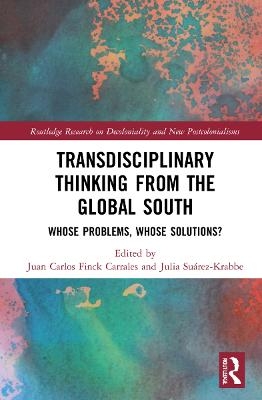
Transdisciplinary Thinking from the Global South
Routledge (Verlag)
978-1-032-00035-0 (ISBN)
This book promotes constructive and nuanced transdisciplinary understandings of some of the critical problems that we face on a global scale today by thinking with and from the Global South. It is engaged in transmodernising, pluriversalising, decolonising, queering, and/or posthumanising thinking and practice.
The book aims to contribute to and challenge current debates regarding knowledge, diversity, and change. This is achieved through the application of transdisciplinary and indisciplined perspectives to the Himalayan Anthropocene; transport services in Mexico City; the EU-Turkey border regimes and policy; egoism and the decolonisation of whiteness; the Witch and the decolonisation of the gender binary; Nepalese students in Denmark; and the decolonisation of global health promotion. The book thereby provides the reader a multiplicity of pathways of knowledges and practices that address current problems co-produced by the dominant Western colonial onto-epistemic outset, giving way to ‘other’ knowledge-practices, towards a pluriversal approach.
This book will be of interest to upper-level undergraduate and graduate students in disciplines such as human geography, development studies, politics, international relations, sociology, anthropology, cultural studies, planning, and philosophy. It is also relevant to researchers, development workers and human rights/environmental activists, and other intellectual practitioners.
Juan Carlos Finck Carrales is a Lecturer of Social Sciences and Urban Planning at Roskilde University (RUC) in Denmark. He teaches and supervises research at the International Bachelor in Social Sciences, the Bachelor in Global Humanities and the Master of Nordic Urban Planning Studies (NUPS). He also coordinates the Language Profile Program of RUC where he is responsible for the Spanish Language Profile. He is part of the Mobility, Space, Place, and Urban Studies (MOSPUS) research group. He holds a PhD degree in Social Sciences from the Program of Society, Space and Technology of RUC. His inter- and transdisciplinary research intersects the fields of Policymaking, Mobility, Decolonial Studies, and Urban and Transport Planning by making the use of ethnographic, participatory, interactive and mixed methods. He has participated in urban projects and formalization processes of transport services in Mexico City, whose outcomes have been reproduced in the media and have influenced the policymaking and regulation of the city. He is a consultant for the Integral Mobility Program of Mexico City 2020-2024. Julia Suárez-Krabbe is Associate Professor in Cultural Encounters at the Department of Communication and Arts, Roskilde University, Denmark, and Distinguished Research Associate at the Ali Mazrui Centre for Higher Education, University of Johannesburg, South Africa. Her work centers on racism, human rights, development, knowledge production, education and decolonisation in Europe and the Americas. Her latest work includes the co-authorship of the report “Stop Killing Us Slowly. A Research Report on the Motivation Enhancement Measures and the Criminalization of Rejected Asylum Seekers in Denmark” from 2018, which includes examinations of state-sanctioned racism in Danish deportation camps, and was written in collaboration with the refugee movement in Denmark. Her work additionally revolves around the ontological, epistemological and existential dimensions of decolonisation. Julia is the author of “Race, Rights and Rebels. Alternatives to Human Rights and Development from the Global South” (2016).
0. Introduction: Horizons of possibility and scientific research: whose problems, whose solutions? 1. Globalisation in theory and practice: Negotiating belonging in Danish higher education. 2. Transmodern philosophy of science in the case of informal transportation in Mexico City: Local ontology and epistemology for transport planning. 3. Decolonising global health promotion: A quest for equity. 4. Theorizing water, shifting scales: The space of the Himalayan Anthropocene. 5. Decolonizing gender: Witches, nomads and the colonial rule. 6. Abyssal lines in borders, race and knowledge: A decolonial perspective on the EU-Turkey joint action plan.7. Over our dead bodies: The death project, egoism and the existential dimensions of decolonisation.
| Erscheinungsdatum | 04.01.2022 |
|---|---|
| Reihe/Serie | Routledge Research on Decoloniality and New Postcolonialisms |
| Zusatzinfo | 1 Halftones, black and white; 1 Illustrations, black and white |
| Verlagsort | London |
| Sprache | englisch |
| Maße | 156 x 234 mm |
| Gewicht | 453 g |
| Themenwelt | Naturwissenschaften ► Geowissenschaften ► Geografie / Kartografie |
| Sozialwissenschaften ► Soziologie ► Spezielle Soziologien | |
| ISBN-10 | 1-032-00035-X / 103200035X |
| ISBN-13 | 978-1-032-00035-0 / 9781032000350 |
| Zustand | Neuware |
| Haben Sie eine Frage zum Produkt? |
aus dem Bereich


